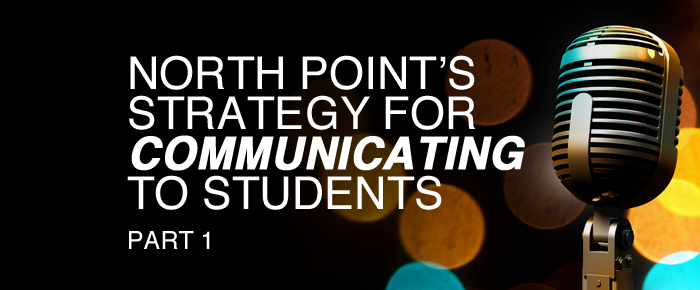North Point is an interesting place to work. There are so many great things about it.
But there are also some things I would put in the category of “freakin’ hard.”
For instance, in a church that is led by Andy Stanley, the “bar” for speakers is unbelievably high. It’s almost impossible to feel like you did a great job. And that’s hard.
If you are speaking in a children’s environment, a student environment, or even just leading a volunteer meeting… you need to be on your game! (Not to mention what it’s like to talk in “Big Church.” But that’s a topic for another time.)
The bar is high.
I felt that pressure this weekend. And I’ll get to experience it for two more weekends, because we just wrapped up our first Frequency of the year.
Frequency is a camp for our 7th and 8th graders. It starts on Friday afternoon and ends on Sunday just after lunch. So, in our world, that means there are four “talks” that need to be planned and executed.
This year I had my number called for the first and the fourth talk.
My first talk was on Friday night at about 10:00pm. This was our students’ first talk of the weekend, after a 2-hour bus ride and a BUNCH of sugar. And there were 700 of them! Talk about intimidating! Friday night camp talks might be the hardest talks in our ministry.
My second talk was the talk that closed out our weekend of camp. At this point in the camp, I was talking to 700 middle schoolers who hadn’t slept for two nights, had their bags packed and loaded onto the buses, and were waiting to head home. That was another pretty difficult talk.
Anyway, while it’s fresh on my mind, I thought it would be a good time to talk about and share how we prepare our “talks” at North Point.
There is no way to do this in one post so, I’ll just get started today and then we’ll finish it up next week.
So… when I’m preparing my talks, this is how I get started.
PREPARING YOUR TALKS
The first step is to ask four questions. These are questions I learned almost 9 years ago when I started on staff at North Point.
Before you think about the funny story you want to tell, the cool illustration you want to show, or how you want The Battle Hymn of the Republic to play behind you as you make your big and final point…
You have to ASK these four questions.
And then you have to actually ANSWER them, too.
1. WHAT do you want them to know?
What do you want them to walk away with? If your middle schoolers had to describe what you were talking about, how would they do it in a sentence or two? Boil it down!
2. WHY do you want them to know it?
If your answer here is “because that is what the next lesson in my curriculum book says,” then keep working! Why do YOU want THEM to know it? The THEM that YOU love and serve and work with every day. How is it going to help them? If you can’t answer this, your talk will lack passion. And it won’t be very good.
3. WHAT do you want them to do?
I’ve heard Andy stop on a couple of occasions and say things like, “We get to say things into a microphone and then people actually apply them to their lives! That is a huge responsibility! We’d better take it seriously.” Think about that. The responsibility is huge! If you want your talk to continue impacting your middle schoolers’ lives beyond the walls of your church, you’ve got to have a clear answer to this question.
4. WHY do you want them to do it?
Get really specific here. Don’t be general. Dig deep, and keep digging, until you have a clear and compelling answer to this question. It’s not enough for students to walk away knowing what they should do about the message you’ve communicated. You’ve got to actually inspire them to do it.
So, when we’re planning our talks here at North Point, that’s where we begin. And then comes the hard stuff! But, we’ll talk about that next week…


